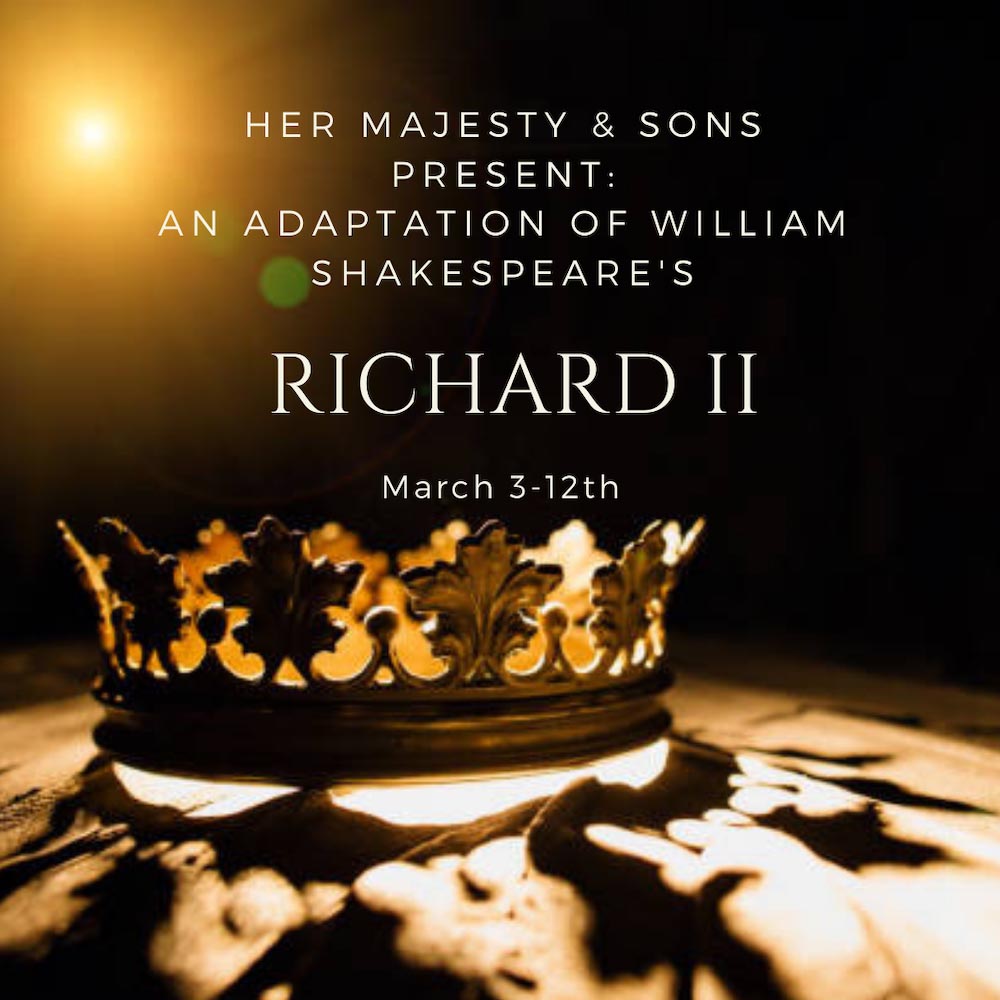A new theater group, Her Majesty & Sons, gave us a glorious gift in the middle of the pandemic: a hilarious production of Twelfth Night at the DC War Memorial in August 2021. Their Richard II opened at the Church of the Resurrection and runs to March 12. They have succeeded in giving opportunities to some of the District’s most talented actors and artists at a time when work is greatly needed.
How did this merry band manage to produce two new productions of Shakespeare, one outside and one inside, in spite of the exigencies of COVID? To find out about this remarkable achievement, and the group’s plans for the future, I interviewed the two founding co-producers, Rachel Felstein and Anna DiGiovanni.
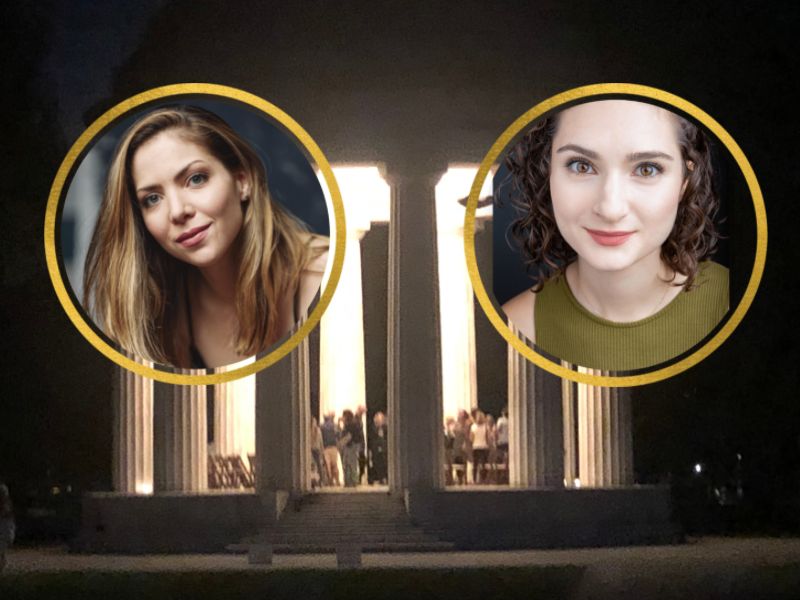
Sophia: It must have taken extraordinary bravery to start a theater group in the middle of a pandemic. When did you come up with the idea of Her Majesty & Sons, why the name, what was your vision of the company, and what’s your model for funding and sustaining?
Rachel: Anna and I were friends before becoming collaborators. We were at a barbeque in my backyard when Anna mentioned she was interested in self-producing. We were deep into the COVID shutdown and were dying to share some work. And I was like, “Girl, produce with me.” I have some experience producing and I jumped at the chance to work with Anna. She is so dedicated and sharp. I knew it would be a blast and of super high quality.
Anna: We compiled a list of Shakespeare plays that could be fun to do and started looking at outdoor locations. That’s when our director, Séamus Miller, came in. We had all met studying Shakespearean acting at the Shakespeare Theatre Company’s Academy for Classical Acting [ACA], and Rachel and I knew what a great director brain he has. I had been wanting to work under his eye for some time, so we reached out and he was immediately on board. The name is a bit of an inside joke among the three of us — we’re always teasing about who “Her Majesty” is and who the “Sons” are. It plays into our commitment to gender-bend roles to create more opportunities for female-bodied and gender-queer actors to do Shakespeare. The vision for the group was really to create some work for ourselves that ignited our creative passions and gave us the opportunity to collaborate with each other. It was really supposed to be a one-off.
Rachel: Yeah, I like to think that Shakespeare himself is “Her Majesty” and we are all her sons! The name is meant to evoke the sense of an Elizabethan acting troupe, which, much like us, were truly collaborative and ensemble-oriented out of necessity. We wanted to make work that aligns with our values — to promote diversity, equity, and inclusion; provide fair wages; and create safe working environments for artists both physically and personally. We want to share our love for Shakespeare’s work with audiences and bring his stories to life in a totally contemporary way without sacrificing their beauty or integrity. We have been so lucky to be supported by our community, which has made it possible for us to produce. Both of our productions have been entirely funded by private donors and crowdfunding campaigns. We are so proud to be a grassroots theatrical enterprise.
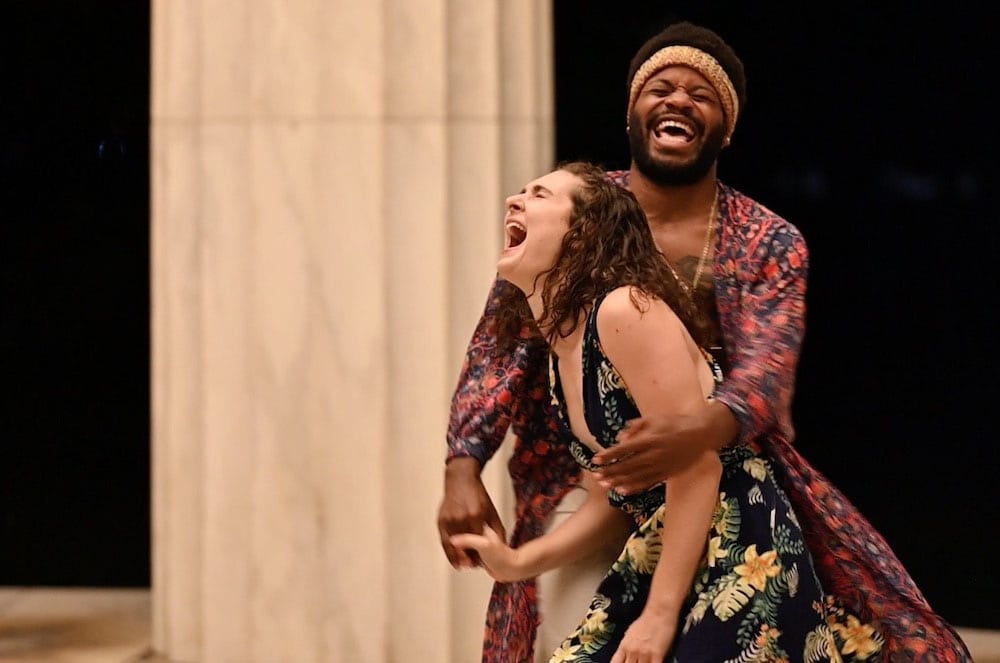
What was behind your selection of Twelfth Night as your first production? Rachel played Malvolio in Twelfth Night, and Anna played Viola. Was that a consideration?
Rachel: We were looking for something fun to help bring life and energy back into our worlds after being shut in for so long. In my opinion Twelfth Night is one of Shakespeare’s best and most production-proof plays. There is delight to be found in it under any circumstances. Though I have the utmost confidence in our abilities and I think we made something truly special out of it, we were looking for something that could be done with a small cast and would be enjoyable to watch regardless of our limited financial resources. After the years we had all been through with COVID, we were not trying to give people a hard time watching our work! It’s also a play that features truly timeless and universal themes in regard to its characters and relationships, so we knew we would be able to make it “of today” and play with gender in casting.
Anna: Twelfth Night is such a fun show with so much heart. We were ecstatic and so blessed that Séamus had already written a 90-minute adaptation full of music, which we knew we could make excellent together. And truthfully, I had wanted to play Viola for some time — I mean I even named my sweet doggo Viola!
Rachel: For myself and as a producer I was slightly bored by the idea of seeing a production of Twelfth Night that featured two white women in the leading lady tracks of Viola and Olivia. Anna is really such a perfect Viola, so that was a no-brainer, and though I would love to play any of Shakespeare’s leading ladies, I was more interested in building a world that challenges narratives that uplift white people exclusively. As a white woman I’m very interested in the role of white women in our society and our complicity in the power structures that oppress so many. I thought it would be interesting to recreate the role of Malvolio as a woman who expects to get what she wants and believes she deserves power over everyone else merely due to her whiteness and her adherence to a hierarchical system that keeps power in power.
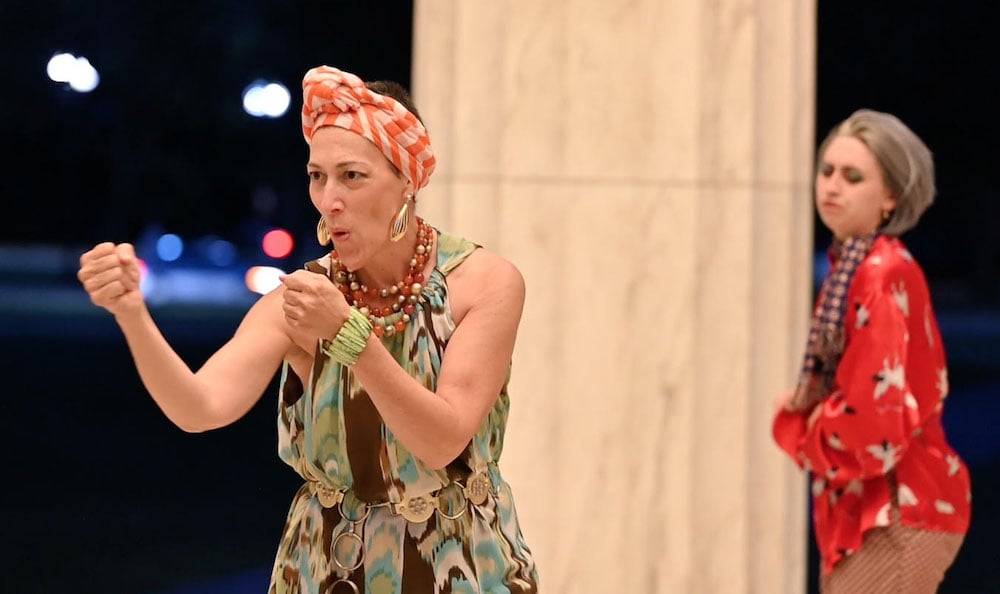
How did you select your creative team for Twelfth Night? How did the pandemic affect that process?
Rachel: We had Séamus on the team from early on, but he had some conflicts that took him out of the first stages of pre-production. We agreed that Anna and I would largely handle casting with Séamus offering suggestions and being given approval before offers went out. I suggested my fantastically talented and lovely friend Shubhangi Kuchibholta to play Olivia, and we were so lucky to have the wonderful Ryan Sellers come on as an insanely excellent Feste and Antonio — a doubling we had previously seen done. Anna and I immediately agreed that our friend Michael Wood (also an ACA grad and my housemate) would make a fantastic Maria and Sebastian. Reading the play I had the idea that Toby and Maria might be gender-swapped; I saw Toby as an expatriate upper-class housewife who has run away to be drunk and free on a tropical island, and Maria as a distant relative of Hank Azaria’s incredible genderqueer character from one of my favorite movies from childhood, The Birdcage. It occurred to me that Maria would have been played originally by an older male actor in drag, and that some of the humor in the writing stems from that gender play. I wanted to highlight that theme in the role in a celebratory, modern way, and we knew Michael would be absolutely brilliant. He and Anna were close from their time at school together, and they have more than a passing resemblance, so we thought it would be fab to have him double as Sebastian. He was so amazing in both roles that many of our audience members had no idea it was the same person; I’m so proud that we were able to create that track for him to shine in.
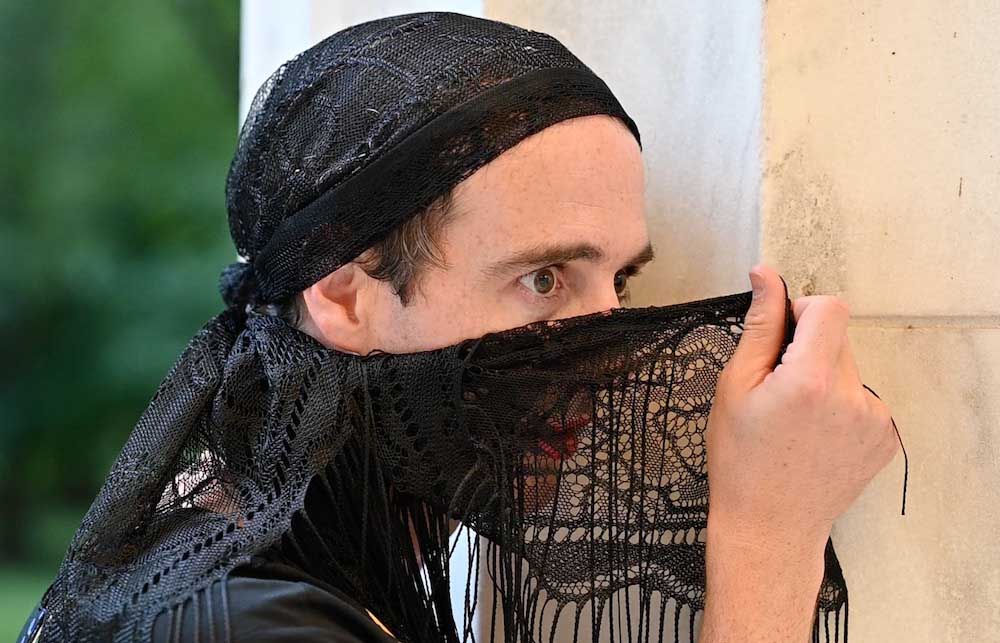
Anna: We got lucky for Twelfth Night and got to work with actors who had been on our bucket list for some time. Terrance Fleming, who was our deeply endearing Orsino and is currently in Richard II, was the Romeo to my Juliet a few years back, and Tori Boutin, who played Andrew Aguecheek and music directed the show, was my roommate when I was in grad school. Tori is someone I continually admire for their creativity and the fierce heart they bring to everything they do. And actually, the marvelous Jessica Lefkow, who played our Lady Toby Belch with brilliance and aplomb, will be directing me in Prologue Theatre’s The Revolutionists this spring. To be honest, the pandemic likely affected our casting in a positive way. We were able to get a truly magnificent cast to sign on to do theater outside in 90-plus-degree weather because everyone was so hungry to work after being kept from doing what we love for so long.
How and why did you choose the DC War Memorial as your first venue? What were the challenges of producing Twelfth Night there in-person, outside, during COVID?
Anna: Séamus brought the Memorial to our attention as he had directed a production of Julius Caesar there before. We were thrilled with the location and we are so grateful to the parks department for their help facilitating. The DC War Memorial was first built as a bandstand, and we knew whatever show we produced, we wanted music to be an integral part of it. It has built-in lighting and it allowed us the unique opportunity to stage the show in the round. One of the biggest challenges was the oak mites that came from the cicadas and caused our entire cast to be covered with bites during the run and tech.
Rachel: I’m still not 100 percent recovered emotionally from the oak mites. It was traumatic.
Anna: Because we were performing outside and during the time when the alarming COVID variants of last fall hadn’t yet emerged, we were able to safely produce and allow vaccinated members of our audience to be maskless if they chose. The other challenge was that as we were performing on a national monument, we had to ward off tourists and wedding photographers on a daily basis.
Rachel: One issue we ran into occasionally was audience members being uncomfortable being near each other despite our measuring distance and providing masks. Honestly, it was a good learning experience for me, to realize that people’s comfort around the virus is such a personal thing and that it was my role as a kind of host to accommodate all of our guests without judgment.
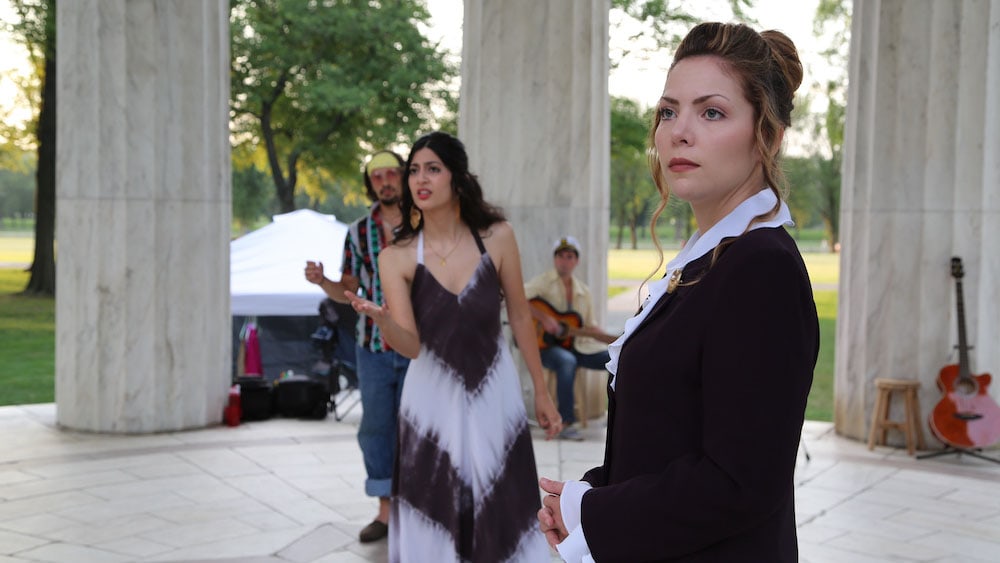
Your focus so far seems to be Shakespeare. Would you ever consider another author? What drives your selection of plays? Do you have a particular preference for specific plays or types of plays?
Anna: We all studied Shakespeare at the ACA, and love how these classic texts still help us uncover parts of our humanity. I think what we love about producing his work in a contemporary setting is that it allows us to make something archaic into something accessible for all. Personally, I am a fan of the plays about love, but that’s because I’m just a huge romantic!
Rachel: Shakespeare brought us together as friends and we feel abundantly fortunate to have these opportunities to bring his plays to life in our own way. We would absolutely consider producing other writers’ work, but our future is contingent on our ability to finance any individual production. Partially as a response to the changing nature of our current climate at large, we take this one show at a time.

Richard II is produced inside, at the Church of the Resurrection, at a different stage of the pandemic. How did that change your approach to the production and the creative team?
Anna: Richard II is a special one, as Acacia Danielsson, who plays our Richard, is a member of their congregation, so it was something that drew us to that beautiful location.
Rachel: We are so grateful that our acting company put up with the onerous task of rehearsing in respirators until tech, in addition to testing twice a week. Thanks to DC for making tests relatively easy to acquire, and to our stubborn commitment to an abundance of caution, Anna and I have spent many hours driving around town picking up tests from libraries and COVID centers far and wide.

What drew you to Richard II as your second production? How did you select your actors and creative team?
Anna: Honestly, much like with Twelfth Night, Séamus has had a concept to adapt Richard II for some time. He brought it up to Rachel and me knowing that Acacia would be playing Richard and we immediately agreed. It was a harder play to cut down to a smaller cast, but we did it and I am especially proud of how well the actors and team handled navigating rehearsals, masks, and testing in the peak of this COVID variant.
Rachel: Séamus has had such a clear vision for this show from the start, and he took the lead initially in casting this project. We assisted when needed, and the acting company in Richard II has absolutely blown me away with their passion and dedication — not to mention the sheer enjoyability and clarity of their work. We pulled heavily from our ACA community: Cerra Cardwell, Acacia Danielsson, Emily Erickson (who is also music director and composer for the piece), Shayna Freedman, and Ring Yuqi Yang are all ACA grads. We brought back Terrance Fleming and Ryan Sellers from Twelfth Night, and we are thrilled to have two more fantastic DMV theater vets — Francesca Marie Chilcote and Helen Hayes Award Winner Ryan Tumulty — fill out the cast. As with Twelfth Night, Richard II has benefited greatly from the work and influence of the wonderful Kathleen Akerley, who has served as artistic associate on both projects. She and Séamus have a long and healthy collaborative relationship that has informed his and our work in such an important way.
What are your plans for the future? Another outside production? Have you selected a play?
Anna: No hard plans yet!
Rachel: One of the advantages to not being a theater company has been that we have the flexibility to take every opportunity as it comes and pivot in whatever ways are necessary to do right by the work and the people that make it. We’ve definitely had some discussions about the future, but as friends and collaborators, we are dedicated to supporting each other as we walk our own paths. The landscape of theater work has been constantly shifting over the past few years, and we don’t know what’s around the corner for any of us. We do know that we have this trusted team to make our work with whenever those stars align, and for that we’re so lucky and grateful.
An Adaptation of William Shakespeare’s Richard II plays March 3 to 12, 2022, presented by Her Majesty & Sons performing at the Church of the Resurrection, 501 E Street SE, Washington, DC, Thursdays at 7:30 p.m., Fridays at 8 p.m., and Saturdays at 7 and 9:30 p.m. (Note that the sign on the building refers to a Baptist church rather than to the Church of the Resurrection.) Tickets are $30 and $15 and can be purchased online.
Running Time: 90 minutes, with no intermission.
COVID Safety: Patrons are asked to wear masks throughout the performance.
Rachel Felstein is ecstatic to be producing Richard II with this remarkable team of artists and collaborators. Originally from NYC, Rachel received her MFA from the Shakespeare Theatre Company’s Academy for Classical Acting. She has been fortunate enough to work as an actor with DMV groups such as Arena Stage, Mosaic Theater Company, Taffety Punk, and Washington Stage Guild, among others. Most recently, Rachel was seen as Malvolio in Her Majesty & Sons’ critically acclaimed production of Twelfth Night (on which she also served as a producer and designer). She is 1/3 of the producing and performing team for Night@Newcastle, a live-stream series that featured over 20 DMV artists’ performances in 50+ concerts, and in collaboration with companies such as the Olney Theater. Rachel is also a musician and a songwriter, whose original work has been featured in 3 plays. Up next, Rachel is thrilled to be preparing to play the role of Vivie in the Washington Stage Guild’s upcoming production of Mrs. Warren’s Profession. hrachelfelstein.com/
Anna DiGiovanni is giddy to be producing again with Her Majesty & Sons this winter. She was last seen as Viola in Twelfth Night at the DC War Memorial. DC Area work includes Measure for Measure (Chesapeake Shakespeare Company), She Kills Monsters (Rorschach Theatre), Venus in Fur (4615 Theatre), The Explorers Club (Prologue Theatre), Romeo and Juliet (Chesapeake Shakespeare Company), and Pericles (Academy for Classical Acting). Anna is a proud MFA graduate of the Shakespeare Theatre Company’s Academy for Classical Acting at GWU.
SEE ALSO:
New troupe to gender-bend ‘Twelfth Night’ at the DC War Memorial (news story)
A ‘Twelfth Night’ love fest by Her Majesty & Sons, with wit as leitmotif (review by Sophia Howes)
Her Majesty & Sons boils down ‘Richard II’ and stirs in more myth (review by Bob Ashby)
Her Majesty & Sons returns with timely new ‘Richard II’ (news story)


